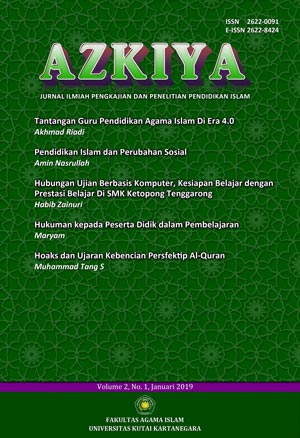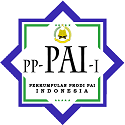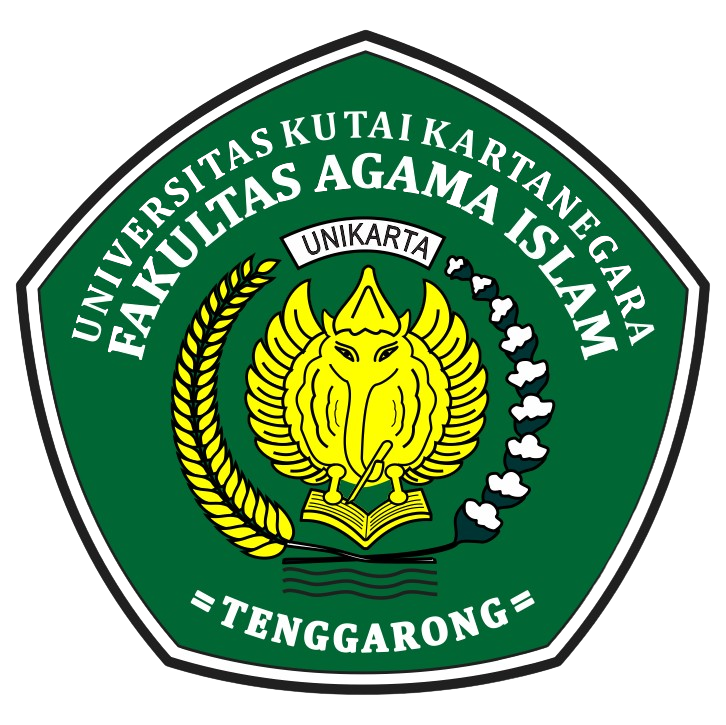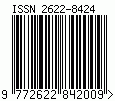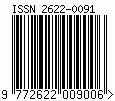TANTANGAN GURU PENDIDIKAN AGAMA ISLAM DI ERA 4.0
DOI:
https://doi.org/10.53640/azkiya.v2i1.717Kata Kunci:
Teacher, Islamic Religious Education, Era 4.0Abstrak
The teacher's role is very central as the direct implementer of the curriculum designed by the Government, so teachers must continue to innovate and improve the quality of human resources in line with the development of Information and Technology. In the era of 4.0 Islamic Religious Education teachers must have competencies, there are at least 4 competencies that must be possessed, Teachers must be able to conduct Comprehensive Assessment, teachers must have 21st century competencies namely mastery of Information Technology, Teachers Must be able to present Modules in accordance with Student Passions, and Teachers must able to perform Innovative Autentic Learning. In addition to these competencies, teachers must also pay attention to the challenges in areas 4.0 such as teaching in communities that have diverse cultures with multi-language competencies, teaching for active learning, teaching and accountability, so that the challenges of educational development can be passed by teachers with human resources who are always innovatingReferensi
A. M. Saefuddin, Pendidikan Pesantren dan Globalisasi Serial Khotbah Jumat. No 203 Mei 1998,h. 68-69
Abu Ahmadi et all., Psikologi Belajar, (Jakarta: Rineka Cipta, 1991).
Abuddin Nata, Peranan Pendidikan Agama Dalam Menghadapi Tantangan Abad 21, Harian Pelita.
Febrianto Adi Saputro, Mendikbud Ungkap Cara Hadapi Revolusi 4.0 di Pendidikan, https://www.republika.co.id/berita/pendidikan/eduaction/18/05/02/p8388c430-mendikbud-ungkap-cara-hadapi-revolusi-40-di-pendidikan, diakses Rabu, 18 Juli 2018.
Hendra Suwardana, Revolusi Industri 4. 0 Berbasis Revolusi Mental, JATI UNIK, Vol.1, No.2, (2017).
M. Arifin, Filsafat Pendidikan Islam, (Jakarta: Bina Aksara, 1987).
M. Saefuddin, Desekularisasi Pemikiran; Landasan Islamisasi, Cet. (Bandung: Mizan, 1997).
Moh. Fadhil al-Djamali, al-Tarbiyah al Insan al-jadid (Tunisia al-Syghly: Matba‟ah al-Ittihad al-„Aam, 1967).
Moh. Uzar Usman, Menjadi Guru Profesional, Cet,I, (Bandung: Rosdakarya,1994).
Mohammad Djazaman, Konsep Pendidikan Islam, Jurnal Ilmu Pendidikan Islam, Volume 1, tahun 2009.
Muhammad Arifin, Ilmu Pendidikan Islam.
Muhammad Arifin, Ilmu Pendidikan Islam: Tinjauan Teoritis dan Praktis Berdasarkan Pendekatan Interdisipliner, (Jakarta: PT. Bumi Aksara, 2003).
Muhroqib, Ilmu Pendidikan Islam, (Yogyakarta: LKiS, 2009).

